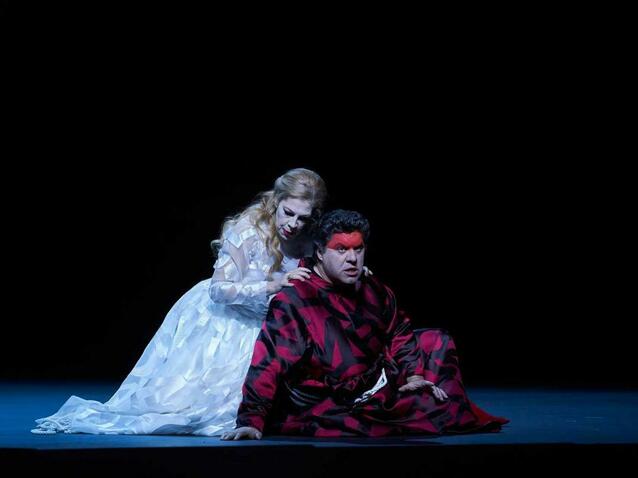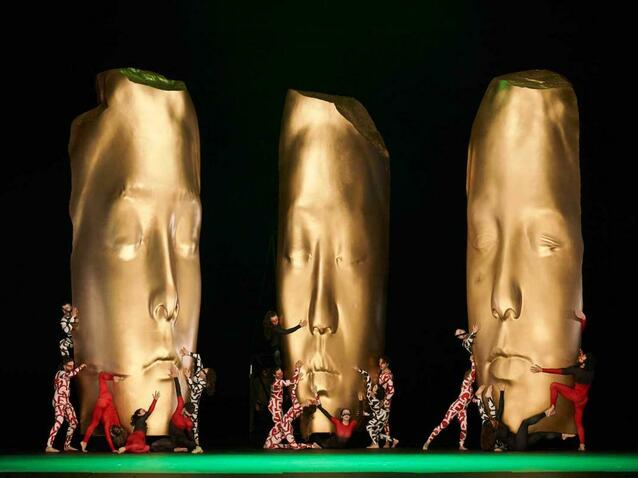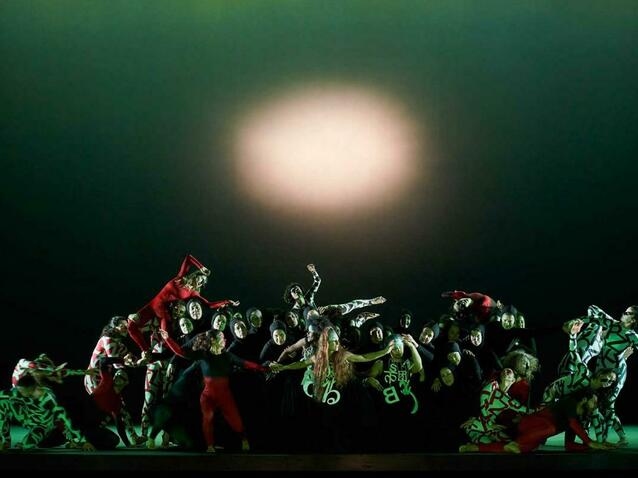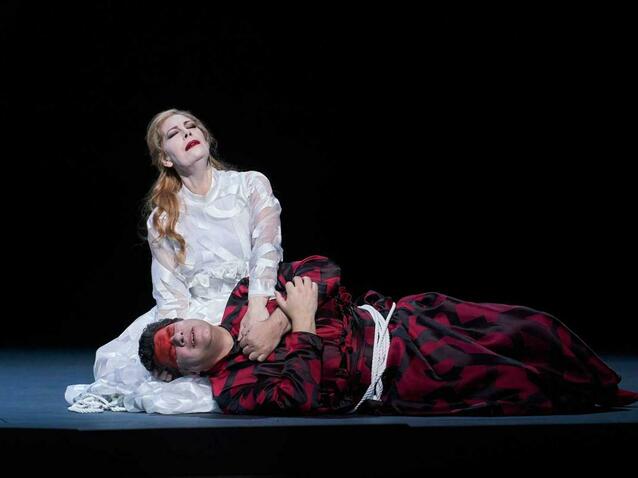 © Javier del Real
© Javier del Real
If Shakespeare's Macbeth is already bloodthirsty, dark, barbaric, ferocious, atavistic and telluric, Verdi's operatic reworking of this work not only keeps intact the strength of the original but, by concentrating and essentialising it, he even increases it. Verdi's Macbeth is the ultimate party of wickedness and an orgy of moral perversion.
Stylistically, it is a rare opera that does not fit anywhere – chronologically it should be inscribed in late bel canto, but both its orchestral and vocal parts constantly exceed these limits. For the role of Lady Macbeth, Verdi required “una brutta voce” (an ugly voice). This contradiction in the terms –an ugly voice for singing to make bel canto – already tells us about the uniqueness of Macbeth, a seductively ugly opera. It is disturbing, uncomfortable and lacks a love story between the two main characters - all the others are circumstantial - who destroy each other fiercely.
The world premiere of the new in house production of Macbeth that the Liceu presented on its stage ended with the audience standing and applauding enthusiastically. The reasons and merits of this success are diverse.

(c) Gran Teatre del Liceu / Javier del Real
The luxurious new production, which according to Liceu is close to two million euros in cost, was signed in the stage direction, scenography and costumes by the prestigious sculptor Jaume Plensa, known worldwide for his surprising sculptures of large format that very often feature human heads made with letters or metal mesh. It wasn't the first time that Plensa worked for the stage, he had done it years ago as a scenographer with the Fura dels Baus theatre company, but it was the first time that he took on the stage direction of a piece.
Plensa's proposal widely convinced the public but it is neither perfect nor completely well resolved and presents some important irregularities.
As stage director the artist was quite conventional in his treatment of the main characters, we learned nothing new about Macbeth and his perfidious wife and at no time were we clear on what the director's dramatic intention was or where it was heading towards. If he knew, he didn't know how to explain it too well through the characters. He was more daring and original in the choral scenes but always treating the choir as an anonymous mass.
The costumes worked and were filled with Plensa's particular alphabetic universe but were generally conventional and in the case of Lady Macbeth inadequate. The scenography, the section where more audacity and originality was expected, was resolved well, but in a strange way. Yes, we had Plensa’s famous giant heads but only in a few moments which at times, like in the final scene for example, lacked a clear dramatic meaning. In many scenes, he opted for a scene that was completely or almost empty, with characters wandering, lost, around the stage. In this sense, Urs Schönebaum's magnificent lighting saved quite a few scenes.
As much as the famous sculptor has repeatedly stated that he had always wanted to direct Macbeth, it seems that Plensa's exquisite sensibility full of suggestions would be a better fit for the subtleties of Pelléas et Mélisande or in the psychological deepening of A kékszakállú herceg vára (Bluebeard's Castle) rather than in the bloodthirsty truculence of Macbeth.

(c) Gran Teatre del Liceu / Javier del Real
The musical section was delivered at a very high level and, from this point of view, this Macbeth from the Liceu turned out to be anthological.
First of all, we must highlight the excellent work of Josep Pons at the head of the orchestra. Pons, accredited conductor of Wagner or Strauss, also knows how to be a great Verdian conductor. He placed the orchestral sound at that exact point where bel canto can barely contain the force of the score. He obtained a dark and menacing sound in the exclusively orchestral parts and accompanied the singing well, but always pushing it - without stridency but forcefully - towards expressive intensity.
There is no good Macbeth without a top-notch Lady Macbeth. She, much more than her hesitant husband, is the one who, with the most absolute amorality, plots the horrific crimes that unravel throughout the play. Lady Macbeth and Otello's Iago are the true evil prince and princess in the history of opera, even above Tosca's perverse Scarpia who, next to them, is only an apprentice.
As Lady Macbeth, we had Sondra Radvanovsky on the opening night. She was probably the best possible choice for her vocal suitability, stage presence and experience. Radvanovsky knew how to give her singing the "brutta voce" that Verdi wanted, a beautiful "brutta voce", with force in the emission, impeccable projection, powerful highs attacked with determination and the exquisite "fil di voce" that Verdi calls for at the end of the madness scene. On stage, she was imposing, dominating the character and dominating the space. Sondra Radvanovsky's Lady Macbeth will be one to remember.

(c) Gran Teatre del Liceu / Javier del Real
Luca Salsi also excelled in the role of Macbeth. Salsi has it all: a voice suited to the score, phrasing, style and a formidable stamina to see through one of the most exhausting baritone roles in the repertoire from beginning to end without faltering.
In Macbeth there is a third key character both musically and dramatically, the choir. The choir of witches in the first and third act embody fatality, fate and add to the work its disturbing demonic dimension. The initial female chorus was out of tune, but from there on all the many choral parts of the work, both male and female, reached a very good level.
It is a shame that Banquo dies prematurely at the end of the second act, especially if you have a singer like Erwin Schrott as Banquo. His performance was of a very good level, but the role did not afford him more.
Francesco Pio Galasso, with a powerful voice but not particularly beautiful or suitable played Macduff. Fabián Lara fulfilled the role of Malcolm. Gemma Coma-Alabert solved the role of lady maid very well and David Lagares coped with the small roles of doctor, servant, hitman and herald with total sufficiency.
The version of Macbeth that was offered was the so-called "traditional", that is to say, the Italian translation of the French version of 1865 which reworked the original Italian version of 1847. It is usual to cut the ballet of the third act in this traditional version, which Verdi had to compose in order for the new version of the work to be accepted in Paris. In the Liceu performance, however, the ballet was included and Antonio Ruiz's clever "demonic" choreography helped to make the music, which has nothing to do with the rest of the score, more passable and managed to make scenic sense and dramatic coherence of an irrelevant afterthought.
Xavier Pujol
Barcelona, 16th February 2023
Macbeth by Giuseppe Verdi. Luca Salsi, baritone. Sondra Radvanovsky, soprano. Erwin Schrott, bass-baritone. Francesco Pio Galasso, tenor. Gemma Coma-Alabert, mezzosoprano. Fabian Lara, tenor. David Lagares, baritone. Orchestra of Gran Teatre del Liceu. Choir of Gran Teatre del Liceu. Josep Pons, conductor. Jaume Plensa, stage director, scenography and costumes. Urs Schönebaum, lighting. Antonio Ruiz, choreography. Production by Gran Teatre del Liceu. Gran Teatre del Liceu.
the 20 of February, 2023 | Print
Comments